The following worksheets contain a set of questions whose answers will help classify the primary (and possibly secondary) learning style of each student. Once you know how they learn, you will have an opportunity to be a more effective teacher by tailoring your lessons, worksheets, and quizzes in a way that your students will more easily absorb. These worksheets will help you get to know and understand yourself better as a learner. You can grow infinitely as a students from taking your time with this section. Each set of worksheets also contains tips on how to maximize a student's learning style by presenting information in a way they can more easily assimilate.
Printable Study Skills Worksheets
Click the buttons to print each worksheet.

Understanding Your Learning Style
Everyone is special and unique with different ways of doing things, including different learning styles. A specific style of learning indicates how your brain gathers and processes information.

Visual Learners
"Seeing is believing" and visual learners typically learn by what they are able to see or visualize. Approximately 65 percent of the population are visual learners. People who learn better visually usually like to have front row seats, whether in the classroom or at a sporting event or movie theatre for the best view.

Tips for the Visual Learner
Use charts, maps, posters, and videos whenever possible to study. Watch the person speaking and observe their body language and facial expressions. It’s usually best to study alone in a quiet atmosphere.

Auditory Learners
Auditory learners are very good listeners who prefer hearing materials rather than reading it.

Kinesthetic or Tactile Learners
Kinesthetic or tactile learners absorb information through the sense of touch, physical activity, and experimental projects. These individuals prefer the hands-on approach to learning new things. Roughly five percent of the population are kinesthetic or tactile learners that study best in situations that require them to be active in some manner.

Tips for the Tactile Kinesthetic Learner
Get comfortable when studying such as lounging in a chair or comfy couch. Kinesthetic learners are probably the only ones who can study effectively by laying across the bed.

What Type of Learner Are You?
The following chart will help you discover your individual learning style. Answer the questions in the far left column and then see which of the responses best fit that situation.

Strategies for Taking Good Notes
Often, students don’t realize how important it is to take good notes. Taking good notes is an acquired skill that can serve as an important tool for understanding key concepts and preparing for tests.

Cornell's 5Rs of Note Taking
Use the worksheet at the end of this chapter to use the Cornell system, or divide your notebook paper into 5 sections as shown on the worksheet.

Mind Map Method
Mind mapping is a creative technique that can help note takers quickly identify the structure of a subject and understand how all of the pieces fit together.

Periodical Method
Using this simple method is excellent for reviewing main subjects and key ideas. Divide a sheet of paper into three columns.

Interactive Notes
Sometimes referred to as the “BFA System” (Before, During, and After), interactive note taking is a simple way to process reading assignments and develop ideas for easier recollection.

Reading for Changes
This method of note taking is when the student looks for changes or shifts in the text to help prompt memory recall, and is probably more useful when reading fiction.

Title Talk
This is an easy pre-reading method of note-taking that teaches students how to create their own ideas and predictions by linking the title with the text. Write down the title of the book or chapter in the center of your page.

Cornell 5R System
A concept outline of the Cornell Note Method. You can use this to prep your class notes much more efficiently.


Interactive Notes Template
Make sure to turn background printing on so that the entire template makes it out.

What's the BIG Idea?
List the reasons why you thought this was the main idea of the book or chapter. Include relevant page numbers.

Study Methods That Work
Creating acronyms and acrostics are great strategies to help you remember information because they offer cues for facts and ideas that need to be recalled later.

Location Method
Use this method to memorize certain items on a list by imagining where each one is located in a specific location such as a room, closet, or cupboard.

PRWR Method - Preview, Read, Write, Recite
Repeating things over and over is a highly effective way to commit information to memory. Read out loud to yourself or in a study group.

Study Trees/Webs
Using a study tree or web that branches out is an excellent way to fill in the gaps for areas that you have not memorized yet. This is a good study method for scientific or technical subjects where you need to know a lot of information for just a few main points.

Flashcards and Note Review
Flashcards are excellent tools for memory recall that can be used in a variety of ways. They are great for studying just about any topic including spelling words, maps, places, and facts, as well as multiple-choice or short essay exams.

Study Groups
A study group can be very helpful when preparing for exams, reports, or class discussions. Some students are reluctant to ask questions in a large classroom setting but find it much easier in a small study group.
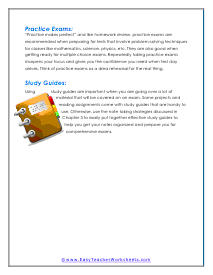
Practice Exams
"Practice makes perfect" and like homework review, practice exams are recommended when preparing for tests that involve problem-solving techniques for classes like mathematics, science, physics, etc. They are also good when getting ready for multiple choice exams.

Getting Ready for the Big Test
Set up your study schedule based on how much time you have before the actual test, whether it's a couple of days, weeks, or months. Once you have a schedule, make sure you stick to it! Last minute cramming will only increase your anxiety which could make you more forgetful.
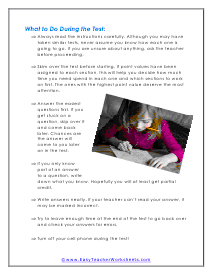
What to Do During the Test
Always read the instructions carefully. Although you may have taken similar tests, never assume you know how each one is going to go. If you are unsure about anything, ask the teacher before proceeding.

Strategies for Specific Types of Test
Be prepared by bringing whatever materials are needed such as pencils, erasers, rulers, calculators, etc.


Where to Study
Most students find its best to study in the same place each day such as the bedroom, sitting at a table at the library or in the family kitchen, on a comfortable couch in the living room, or at a classroom desk in study hall.
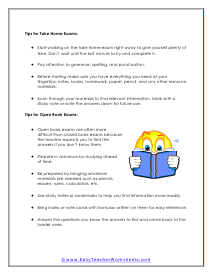
Tips for Take Home Exams
Start working on the take home exam right away to give yourself plenty of time. Don't wait until the last minute to try and complete it.
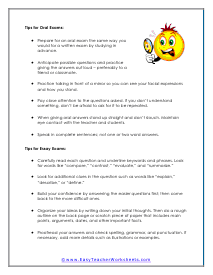
Tips for Oral Exams
Prepare for an oral exam the same way you would for a written exam by studying in advance.

Tips for Multiple-Choice Tests
Study well in advance so that you are familiar with keywords and phrases.

How to Calm Your Nerves Before and During the Test
Some students have extreme test anxiety that can actually interfere with their performance on exam day. Reasons for this may be pressure to perform well, previously failed exams, or the fear of failure.

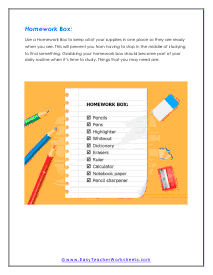
Homework Box
Use a Homework Box to keep all of your supplies in one place so they are ready when you are. This will prevent you from having to stop in the middle of studying to find something. Grabbing your homework box should become part of your daily routine when it's time to study.
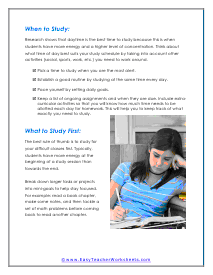
When to Study
Research shows that daytime is the best time to study because this is when students have more energy and a higher level of concentration.

Studying With a Friend
Would studying with a friend help you get more work done? The answer depends on you and your friend(s). If this just turns into a gab session with everyone joking around, then there are no benefits to studying with someone else.
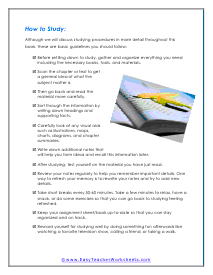
How to Study
Although we will discuss studying procedures in more detail throughout this book, these are basic guidelines you should follow.
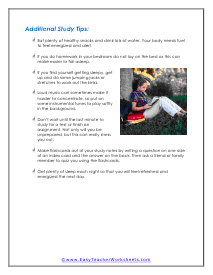
Study Skills Additional Tips
Eat plenty of healthy snacks and drink lots of water. Your body needs fuel to feel energized and alert.
How To Improve How You Study
We often spend a tremendous amount of time working to learn things, but often neglect looking at our entire process of learning. How do we know that the method we are using is the most effective for us? If it is important to learn new things, should we not find the best and most efficient way to complete this task. Think about it this way, if you are in sixth grade and it takes you fifteen hours a week to study and you are getting lower As. Would it not make sense to find method of studying that is more efficient, meaning you would learn the same amount in less time? You could take that time into making sure that you could get high As. Study skills are the methods we take to input information. Just as there are different learning styles, there are different study skills that work for some students, but not others. Students need to learn what works best for them, this usually comes down to trial and error, but after you have a good handle on it, it becomes a breeze as long as you stay consistent. We all need to remember that study skills are not just for students. Adults who do not have a process should take notice of this section as well. No two students learn in exactly the same way, but there are broad categories of learning styles.
Learning to study effectively is a life skill you learn, hone, and maintain. Many people erroneously believe that everyone is born with these skills naturally. Some people have traits that make studying more effortless, but just like any skill, it is learned and maintained through repetition and practice.
To improve how you study, you should schedule study time on your calendar and study early, often, and in manageable allotments of time. It is also critical to create an environment that encourages focus, reflect on what study habits worked well, be willing to change, and practice often.
Each of these tips will help improve how you study. They are a powerful combination of practices and habits that will improve performance if you consistently use them.
1. Schedule Study Time on Your Calendar
Studying doesn’t simply happen, even for the best students. To ensure you have time, maximize the time you do have, and build accountability, most students find it best to schedule a time to study.
By dedicating the time to studying on your calendar, you’re less likely to spend that time doing other things. If you don’t see the results you expect, how much time you dedicate to study can be a helpful indicator of what additional time is needed to increase your scores.
2. Study Early, Often, and in Manageable Time Allotments
Many students make the mistake of waiting to study until immediately before a test or final exam. This practice is ineffective for several reasons.
First, if you don’t understand a foundational principle, you likely don’t retain material from that point forward. Spending a small amount of time reviewing the information as you learn it will help lock it into memory and illuminate gaps in the concepts that may require follow-up.
Second, cramming doesn’t work for deep understanding or long-term retention. Regular, quick, in-depth review of information is a far more effective way to retain concepts for tests and beyond.
3. Create an Environment That Encourages Focus
Simply put, it is critical that you remove distractions and truly dedicate your study time to studying. Turn your phone ringer off, put your phone away, turn off computer notifications, and find a location where others will not interrupt you during your focused work time.
Setting a timer for your study session encourages focus by telling your brain you have a specific time to work. Timers can also be fantastic if you have multiple subjects or assignments to focus on since you can divide your time evenly among them.
To avoid using your phone, I recommend this GUAMEE Cube Timer from Amazon.com. Using a basic but accurate digital timer like this one will ensure that you can stay focused on studying without having to look away from your work until you are done. This timer also has different volume levels, which is perfect for people studying in public spaces or for those of us who have roommates.
4. Reflect on What Works Well for You and Be Willing To Change
Take the time to review your grades, test scores, and how you feel about your learning. If you are getting good results and are happy with your process, stick to it. If you are not getting the grades you think you should be, it’s helpful to try new things, employ new methods to retain the information, and enlist others for assistance when needed.
Be willing to try new approaches to studying and take the opportunity to discover how your brain works/ Above all, be ready to work with your strengths and find study methods that fit you.
5. Practice Often; Regular Repetition Is Key
Studying and retaining information is a life skill. Approach each study session as an investment of time in yourself. Each successful study session is like adding another brick to your educational foundation. If you practice enough and stick with your schedule, you’ll have a solid understanding of what you want to study in no time!
Key Takeaways
Learning to study effectively is just like learning any other skill. Dedicate time to learn new techniques, schedule time to learn in a focused environment, review what is working and practice. Repetition builds the mental muscle to make studying less arduous and more of a short, regular event to help commit concepts and material to memory.

